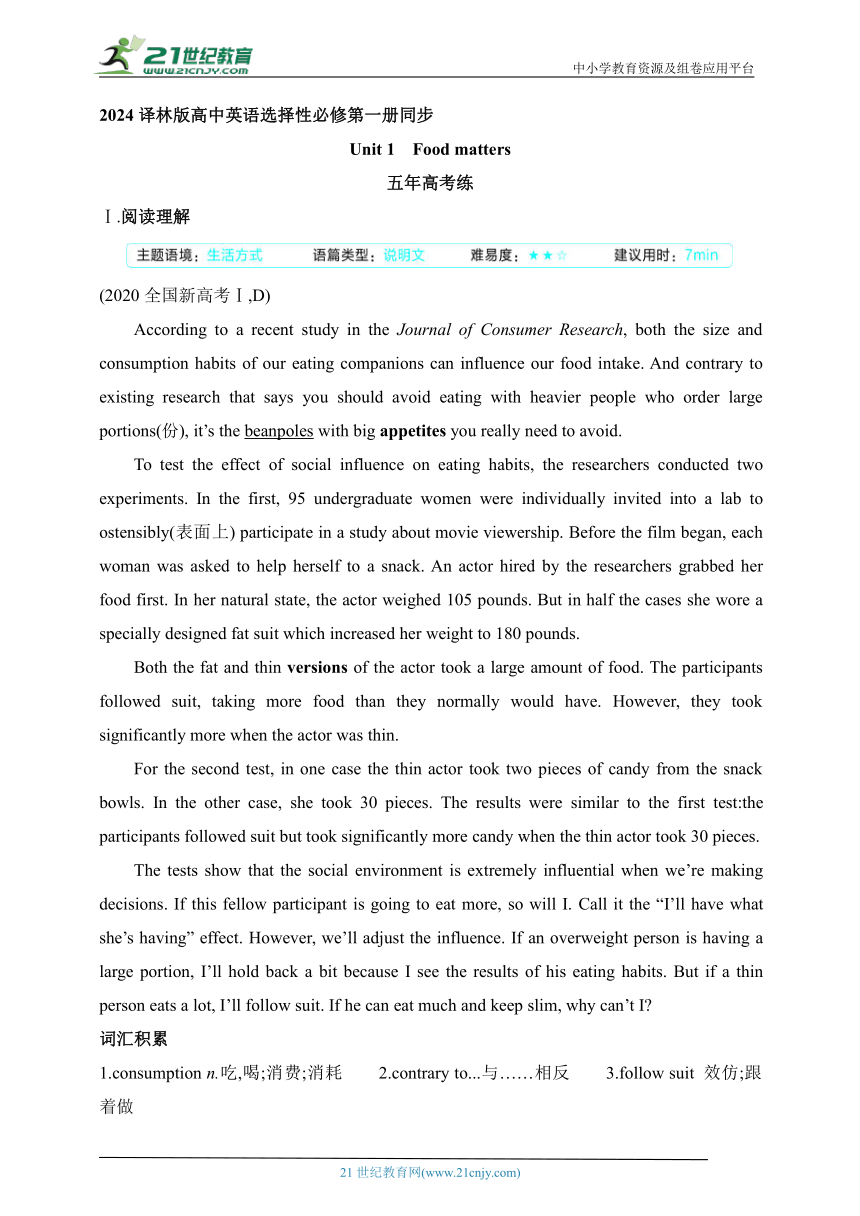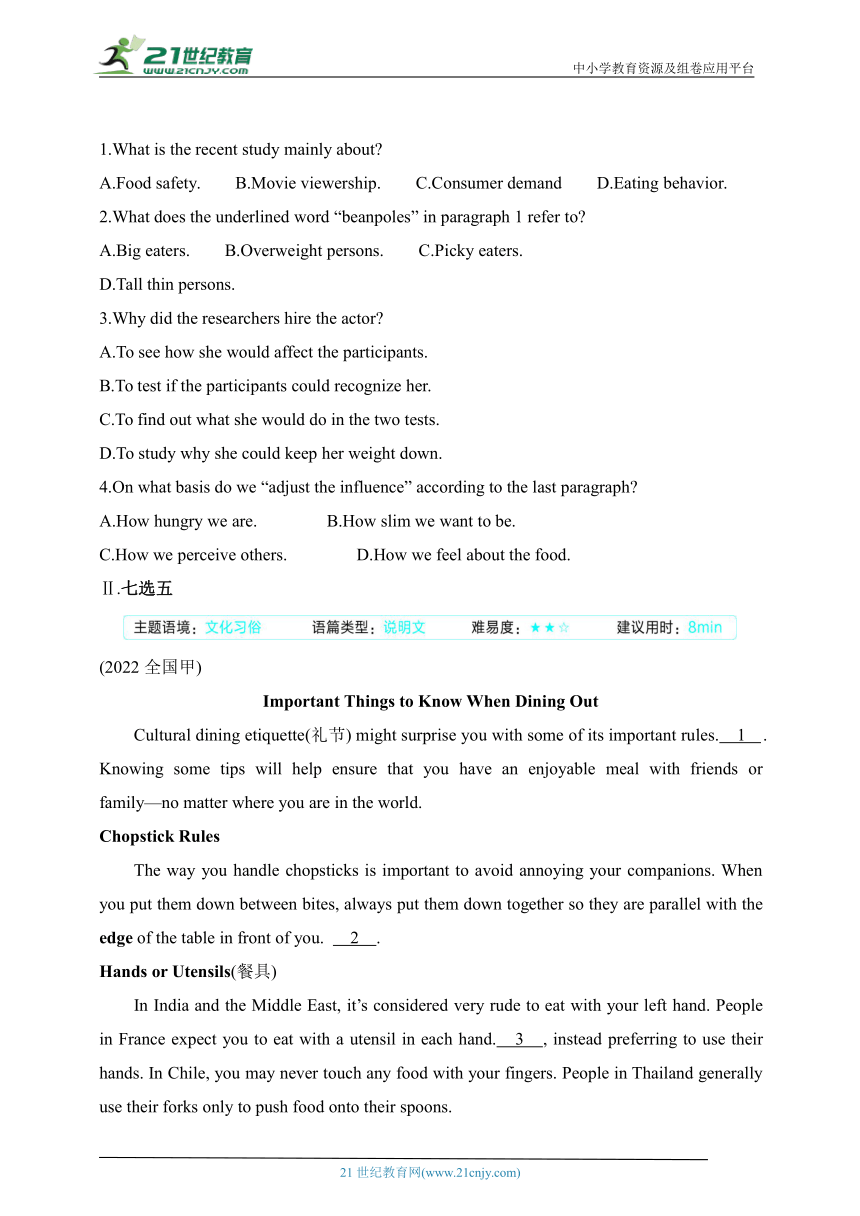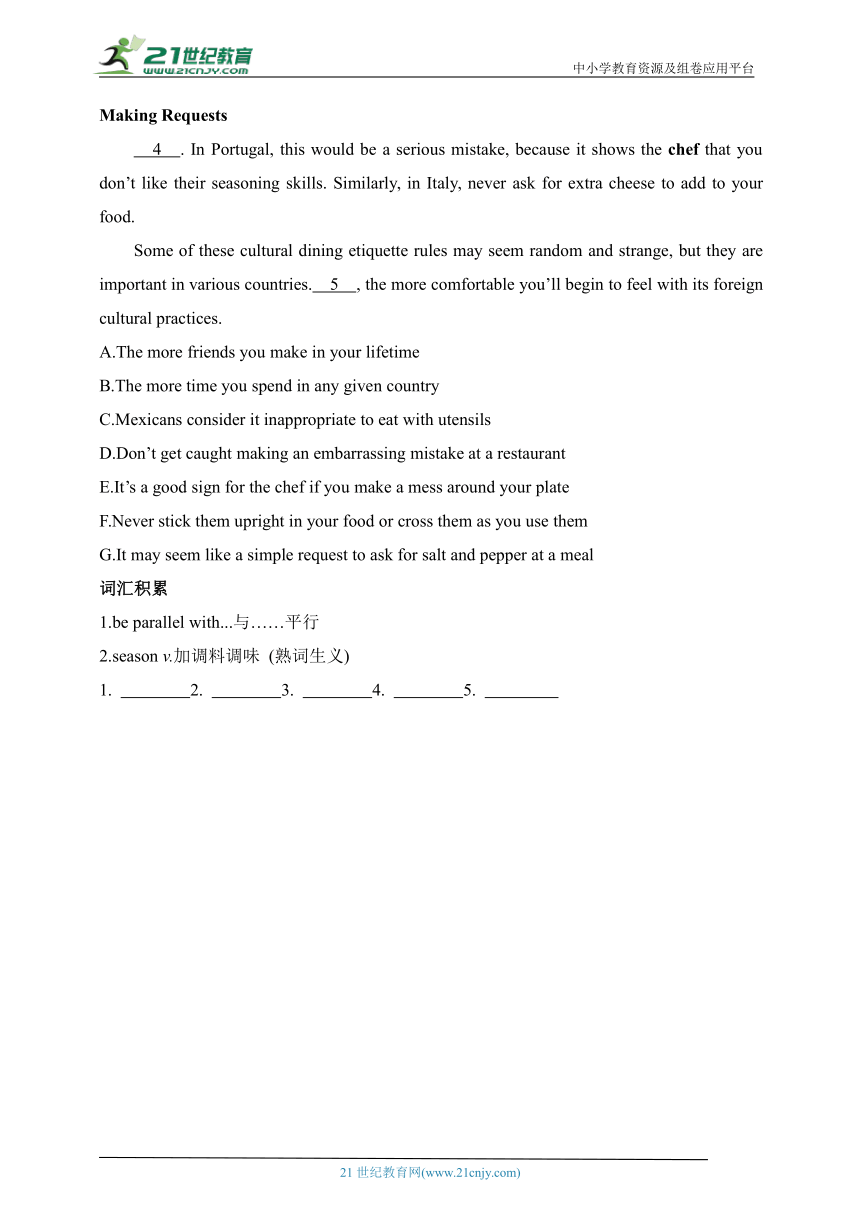2024译林版高中英语选择性必修第一册同步练习--Unit 1 五年高考练
文档属性
| 名称 | 2024译林版高中英语选择性必修第一册同步练习--Unit 1 五年高考练 |

|
|
| 格式 | docx | ||
| 文件大小 | 1007.0KB | ||
| 资源类型 | 试卷 | ||
| 版本资源 | 牛津译林版(2019) | ||
| 科目 | 英语 | ||
| 更新时间 | 2023-11-13 00:00:00 | ||
图片预览



文档简介
中小学教育资源及组卷应用平台
2024译林版高中英语选择性必修第一册同步
Unit 1 Food matters
五年高考练
Ⅰ.阅读理解
(2020全国新高考Ⅰ,D)
According to a recent study in the Journal of Consumer Research, both the size and consumption habits of our eating companions can influence our food intake. And contrary to existing research that says you should avoid eating with heavier people who order large portions(份), it’s the beanpoles with big appetites you really need to avoid.
To test the effect of social influence on eating habits, the researchers conducted two experiments. In the first, 95 undergraduate women were individually invited into a lab to ostensibly(表面上) participate in a study about movie viewership. Before the film began, each woman was asked to help herself to a snack. An actor hired by the researchers grabbed her food first. In her natural state, the actor weighed 105 pounds. But in half the cases she wore a specially designed fat suit which increased her weight to 180 pounds.
Both the fat and thin versions of the actor took a large amount of food. The participants followed suit, taking more food than they normally would have. However, they took significantly more when the actor was thin.
For the second test, in one case the thin actor took two pieces of candy from the snack bowls. In the other case, she took 30 pieces. The results were similar to the first test:the participants followed suit but took significantly more candy when the thin actor took 30 pieces.
The tests show that the social environment is extremely influential when we’re making decisions. If this fellow participant is going to eat more, so will I. Call it the “I’ll have what she’s having” effect. However, we’ll adjust the influence. If an overweight person is having a large portion, I’ll hold back a bit because I see the results of his eating habits. But if a thin person eats a lot, I’ll follow suit. If he can eat much and keep slim, why can’t I
词汇积累
1.consumption n.吃,喝;消费;消耗 2.contrary to...与……相反 3.follow suit 效仿;跟着做
1.What is the recent study mainly about
A.Food safety. B.Movie viewership. C.Consumer demand D.Eating behavior.
2.What does the underlined word “beanpoles” in paragraph 1 refer to
A.Big eaters. B.Overweight persons. C.Picky eaters.
D.Tall thin persons.
3.Why did the researchers hire the actor
A.To see how she would affect the participants.
B.To test if the participants could recognize her.
C.To find out what she would do in the two tests.
D.To study why she could keep her weight down.
4.On what basis do we “adjust the influence” according to the last paragraph
A.How hungry we are. B.How slim we want to be.
C.How we perceive others. D.How we feel about the food.
Ⅱ.七选五
(2022全国甲)
Important Things to Know When Dining Out
Cultural dining etiquette(礼节) might surprise you with some of its important rules. 1 . Knowing some tips will help ensure that you have an enjoyable meal with friends or family—no matter where you are in the world.
Chopstick Rules
The way you handle chopsticks is important to avoid annoying your companions. When you put them down between bites, always put them down together so they are parallel with the edge of the table in front of you. 2 .
Hands or Utensils(餐具)
In India and the Middle East, it’s considered very rude to eat with your left hand. People in France expect you to eat with a utensil in each hand. 3 , instead preferring to use their hands. In Chile, you may never touch any food with your fingers. People in Thailand generally use their forks only to push food onto their spoons.
Making Requests
4 . In Portugal, this would be a serious mistake, because it shows the chef that you don’t like their seasoning skills. Similarly, in Italy, never ask for extra cheese to add to your food.
Some of these cultural dining etiquette rules may seem random and strange, but they are important in various countries. 5 , the more comfortable you’ll begin to feel with its foreign cultural practices.
A.The more friends you make in your lifetime
B.The more time you spend in any given country
C.Mexicans consider it inappropriate to eat with utensils
D.Don’t get caught making an embarrassing mistake at a restaurant
E.It’s a good sign for the chef if you make a mess around your plate
F.Never stick them upright in your food or cross them as you use them
G.It may seem like a simple request to ask for salt and pepper at a meal
词汇积累
1.be parallel with...与……平行
2.season v.加调料调味 (熟词生义)
1. 2. 3. 4. 5.
答案与分层梯度式解析
Unit 1 Food matters
五年高考练
Ⅰ.◎语篇解读 本文是一篇说明文,主题语境为人与自我。到底和胖人一块用餐吃得多还是和瘦人一块用餐吃得多呢 文章通过一项研究对此进行了说明。
1.D 细节理解题。根据文章第一句话“根据《消费者研究杂志》上的一项最新研究,和我们一块用餐的同伴的体形和吃饭习惯都会影响我们的食物的摄入量”可知这项研究是关于我们的饮食行为的。故选D。
2.D 词义猜测题。画线单词所在的句子表示:现有的研究成果认为你应该避免和那些较重的要大份饭菜的人一块用餐,与此相反,你真正需要避开的是那些瘦高个且饭量大的人。画线单词与前面的heavier people意思相反,故选D。
3.A 推理判断题。作者在第二、三、四段描述了研究人员雇用这位演员和那些参与者做的两个测试,发现这位演员的饮食摄入量都会影响参与者的饮食量。由此推断出雇用她的目的就是测试她是如何影响参与者的。故选A。
4.C 推理判断题。根据最后一段第二、三句话(如果这个同伴吃得多,我也要吃得多。我们称之为“我要吃她吃的东西”效应)推断出我们要想调整这种影响,就是要调整我们如何看待别人。故选C。
长难句
原句 And contrary to existing research that says you should avoid eating with heavier people who order large portions, it’s the beanpoles with big appetites you really need to avoid.
分析 本句为主从复合句。that引导定语从句,修饰先行词research;who引导定语从句,修饰先行词people;“you really need to avoid”是省略了关系词的定语从句,修饰先行词beanpoles。
译文 现有的研究表明,你应该避免和那些点大量饭菜的胖子一起吃饭,和现有的研究相反,你真正需要避开的是那些大胃口的瘦高个子。
Ⅱ.◎语篇解读 本文是一篇说明文,主要介绍了外出就餐时需要了解的与文化有关的餐饮礼节。
1.D 过渡句。上句指出与文化有关的餐饮礼节中的一些重要规则可能会让你大吃一惊。 下句指出无论你在世界的哪个地方,知道一些提示将有助于确保你与朋友或家人一起愉快地吃一顿饭。D项衔接上下文。
2.F 细节句。根据小标题“Chopstick Rules”可知本部分讲的是使用筷子的规矩。上句指出吃饭间隙放下筷子的时候,一定要把它们放在一起,和你面前的桌子边缘平行。F项说的是使用筷子的错误做法,F项中的“them”指代“chopsticks”,符合行文逻辑。
3.C 细节句。根据小标题“Hands or Utensils”并结合下文可知本部分讲的是不同国家的人们就餐时用手还是用餐具的不同习俗。设空处的上下文说明了印度和中东、法国、智利、泰国的就餐方式。结合设空处后面提到的“而是更喜欢用手”可知,C项符合语境。
4.G 细节句。根据小标题“Making Requests”可知本部分讲的是“发出请求”。下文指出了在葡萄牙和意大利,发出请求将是一个严重的错误,因为这表明你不喜欢厨师的调味技术。G项符合语境。下句中的“this”指代G项中描述的“简单的请求”。
5.B 细节句。根据设空处后面的逗号和“the more comfortable...”可将答案锁定在A、B两项,构成“the+比较级...,the+比较级...”这一句型。下文指出“你就会开始对这个国家的异域文化习俗感到越舒服”,B项符合语境。下文中的“its”对应B项中的“any given country”。
21世纪教育网 www.21cnjy.com 精品试卷·第 2 页 (共 2 页)
21世纪教育网(www.21cnjy.com)
2024译林版高中英语选择性必修第一册同步
Unit 1 Food matters
五年高考练
Ⅰ.阅读理解
(2020全国新高考Ⅰ,D)
According to a recent study in the Journal of Consumer Research, both the size and consumption habits of our eating companions can influence our food intake. And contrary to existing research that says you should avoid eating with heavier people who order large portions(份), it’s the beanpoles with big appetites you really need to avoid.
To test the effect of social influence on eating habits, the researchers conducted two experiments. In the first, 95 undergraduate women were individually invited into a lab to ostensibly(表面上) participate in a study about movie viewership. Before the film began, each woman was asked to help herself to a snack. An actor hired by the researchers grabbed her food first. In her natural state, the actor weighed 105 pounds. But in half the cases she wore a specially designed fat suit which increased her weight to 180 pounds.
Both the fat and thin versions of the actor took a large amount of food. The participants followed suit, taking more food than they normally would have. However, they took significantly more when the actor was thin.
For the second test, in one case the thin actor took two pieces of candy from the snack bowls. In the other case, she took 30 pieces. The results were similar to the first test:the participants followed suit but took significantly more candy when the thin actor took 30 pieces.
The tests show that the social environment is extremely influential when we’re making decisions. If this fellow participant is going to eat more, so will I. Call it the “I’ll have what she’s having” effect. However, we’ll adjust the influence. If an overweight person is having a large portion, I’ll hold back a bit because I see the results of his eating habits. But if a thin person eats a lot, I’ll follow suit. If he can eat much and keep slim, why can’t I
词汇积累
1.consumption n.吃,喝;消费;消耗 2.contrary to...与……相反 3.follow suit 效仿;跟着做
1.What is the recent study mainly about
A.Food safety. B.Movie viewership. C.Consumer demand D.Eating behavior.
2.What does the underlined word “beanpoles” in paragraph 1 refer to
A.Big eaters. B.Overweight persons. C.Picky eaters.
D.Tall thin persons.
3.Why did the researchers hire the actor
A.To see how she would affect the participants.
B.To test if the participants could recognize her.
C.To find out what she would do in the two tests.
D.To study why she could keep her weight down.
4.On what basis do we “adjust the influence” according to the last paragraph
A.How hungry we are. B.How slim we want to be.
C.How we perceive others. D.How we feel about the food.
Ⅱ.七选五
(2022全国甲)
Important Things to Know When Dining Out
Cultural dining etiquette(礼节) might surprise you with some of its important rules. 1 . Knowing some tips will help ensure that you have an enjoyable meal with friends or family—no matter where you are in the world.
Chopstick Rules
The way you handle chopsticks is important to avoid annoying your companions. When you put them down between bites, always put them down together so they are parallel with the edge of the table in front of you. 2 .
Hands or Utensils(餐具)
In India and the Middle East, it’s considered very rude to eat with your left hand. People in France expect you to eat with a utensil in each hand. 3 , instead preferring to use their hands. In Chile, you may never touch any food with your fingers. People in Thailand generally use their forks only to push food onto their spoons.
Making Requests
4 . In Portugal, this would be a serious mistake, because it shows the chef that you don’t like their seasoning skills. Similarly, in Italy, never ask for extra cheese to add to your food.
Some of these cultural dining etiquette rules may seem random and strange, but they are important in various countries. 5 , the more comfortable you’ll begin to feel with its foreign cultural practices.
A.The more friends you make in your lifetime
B.The more time you spend in any given country
C.Mexicans consider it inappropriate to eat with utensils
D.Don’t get caught making an embarrassing mistake at a restaurant
E.It’s a good sign for the chef if you make a mess around your plate
F.Never stick them upright in your food or cross them as you use them
G.It may seem like a simple request to ask for salt and pepper at a meal
词汇积累
1.be parallel with...与……平行
2.season v.加调料调味 (熟词生义)
1. 2. 3. 4. 5.
答案与分层梯度式解析
Unit 1 Food matters
五年高考练
Ⅰ.◎语篇解读 本文是一篇说明文,主题语境为人与自我。到底和胖人一块用餐吃得多还是和瘦人一块用餐吃得多呢 文章通过一项研究对此进行了说明。
1.D 细节理解题。根据文章第一句话“根据《消费者研究杂志》上的一项最新研究,和我们一块用餐的同伴的体形和吃饭习惯都会影响我们的食物的摄入量”可知这项研究是关于我们的饮食行为的。故选D。
2.D 词义猜测题。画线单词所在的句子表示:现有的研究成果认为你应该避免和那些较重的要大份饭菜的人一块用餐,与此相反,你真正需要避开的是那些瘦高个且饭量大的人。画线单词与前面的heavier people意思相反,故选D。
3.A 推理判断题。作者在第二、三、四段描述了研究人员雇用这位演员和那些参与者做的两个测试,发现这位演员的饮食摄入量都会影响参与者的饮食量。由此推断出雇用她的目的就是测试她是如何影响参与者的。故选A。
4.C 推理判断题。根据最后一段第二、三句话(如果这个同伴吃得多,我也要吃得多。我们称之为“我要吃她吃的东西”效应)推断出我们要想调整这种影响,就是要调整我们如何看待别人。故选C。
长难句
原句 And contrary to existing research that says you should avoid eating with heavier people who order large portions, it’s the beanpoles with big appetites you really need to avoid.
分析 本句为主从复合句。that引导定语从句,修饰先行词research;who引导定语从句,修饰先行词people;“you really need to avoid”是省略了关系词的定语从句,修饰先行词beanpoles。
译文 现有的研究表明,你应该避免和那些点大量饭菜的胖子一起吃饭,和现有的研究相反,你真正需要避开的是那些大胃口的瘦高个子。
Ⅱ.◎语篇解读 本文是一篇说明文,主要介绍了外出就餐时需要了解的与文化有关的餐饮礼节。
1.D 过渡句。上句指出与文化有关的餐饮礼节中的一些重要规则可能会让你大吃一惊。 下句指出无论你在世界的哪个地方,知道一些提示将有助于确保你与朋友或家人一起愉快地吃一顿饭。D项衔接上下文。
2.F 细节句。根据小标题“Chopstick Rules”可知本部分讲的是使用筷子的规矩。上句指出吃饭间隙放下筷子的时候,一定要把它们放在一起,和你面前的桌子边缘平行。F项说的是使用筷子的错误做法,F项中的“them”指代“chopsticks”,符合行文逻辑。
3.C 细节句。根据小标题“Hands or Utensils”并结合下文可知本部分讲的是不同国家的人们就餐时用手还是用餐具的不同习俗。设空处的上下文说明了印度和中东、法国、智利、泰国的就餐方式。结合设空处后面提到的“而是更喜欢用手”可知,C项符合语境。
4.G 细节句。根据小标题“Making Requests”可知本部分讲的是“发出请求”。下文指出了在葡萄牙和意大利,发出请求将是一个严重的错误,因为这表明你不喜欢厨师的调味技术。G项符合语境。下句中的“this”指代G项中描述的“简单的请求”。
5.B 细节句。根据设空处后面的逗号和“the more comfortable...”可将答案锁定在A、B两项,构成“the+比较级...,the+比较级...”这一句型。下文指出“你就会开始对这个国家的异域文化习俗感到越舒服”,B项符合语境。下文中的“its”对应B项中的“any given country”。
21世纪教育网 www.21cnjy.com 精品试卷·第 2 页 (共 2 页)
21世纪教育网(www.21cnjy.com)
同课章节目录
- Unit 1 Food matters
- Welcome to the unit
- Reading
- Grammar and usage
- Integrated skills
- Extended reading
- Project
- Unit 2 The Universal Language
- Welcome to the unit
- Reading
- Grammar and usage
- Integrated skills
- Extended reading
- Project
- Unit 3 The art of painting
- Welcome to the unit
- Reading
- Grammar and usage
- Integrated skills
- Extended reading
- Project
- Unit 4 Exploring poetry
- Welcome to the unit
- Reading
- Grammar and usage
- Integrated skills
- Extended reading
- Project
